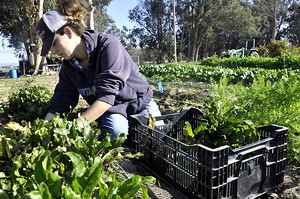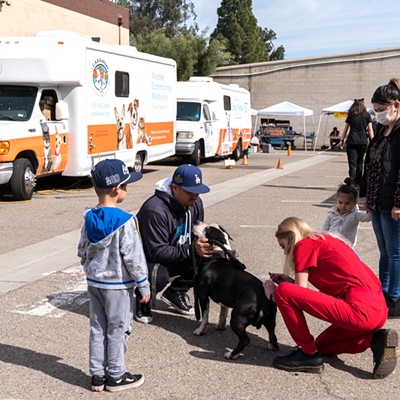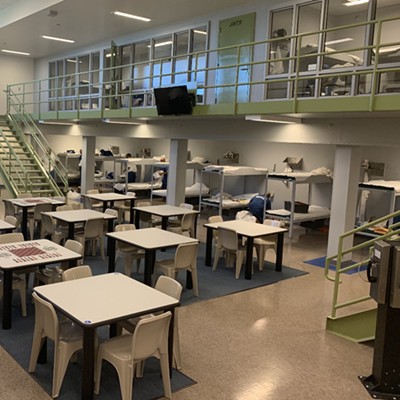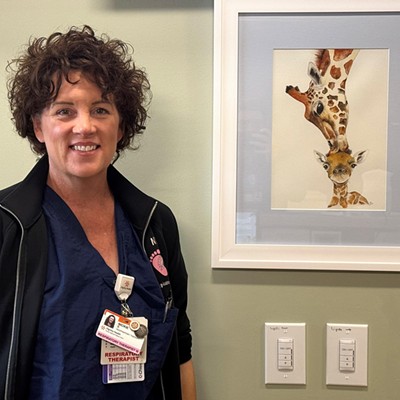View slideshow below

A gloved hand reached between a mass of green leaves with bright purple-red veins and tugged just so at the base of a group of stalks. Out of the sandy soil popped the familiar curve of a beet.
Julia Allen squinted at the vegetable from beneath the brim of her cap, checking it to make sure it was good enough before tossing it in a big black crate with the rest of that morning’s harvest. She picked the crate up and lobbed it forward, moving it along the row of beet greens to the next stop. When she found the right spot, she hunkered down and retrieved more of the purple-red vegetables she would later tie into bunches to sell at Growing Grounds Farms’ Thursday farm stand.
The sun was just starting to warm a bright Wednesday morning in Santa Maria, and Allen’s first task of the day was to harvest enough beets for 10 bunches of four beets each. The farm sells a four-pack for $2. Ariela Gottschalk, the farm’s program director, said sales from the farm stand make up 60 percent of Growing Grounds revenue, while plant sales such as the upcoming Everything Edible on April 5 and 6 bring in 40 percent of the farm’s revenue.
Growing Grounds Farm in Santa Maria operates under the umbrella of Transitions Mental Health Association of San Luis Obispo and Santa Barbara Counties, but Gottschalk said the farm is completely self-funded through plant and farm sales, grants, and donations. It was started in 2000 as a sister program to Growing Grounds in San Luis Obispo. The farm combines horticultural therapy and vocational training to provide people with mental illness employment and a supportive environment. Employees are referred to the farm by organizations throughout the county, and are paid minimum wage—$8 an hour, which is set to go up to $9 in July.
Allen was referred to the program through Transitions Mental Health, and she said it’s been a great way to spend her time.
“I needed to get some job experience for résumés,” Allen said. “And I like to garden, so I was excited to work here.”
At 23 years old, she’s one of the youngest employees working at the farm. She’s quiet and contemplative while she gardens, steadily progressing through the task at hand.
After she finished pulling the allotted number of beets, Allen walked the crate over to a prepping station to bunch them. With a long gait, she covered a lot of ground with each step and dwarfed the vegetable tops as she moved between rows. She counted beets into groups of four and gently shook them to loosen dirt from the tiny hair-like roots, and it fell to the wooden table top with a hushed smattering sound. Beet leaves brushed up against each other as she tied the stalks together, releasing the mingled scent of earth and fresh greens into the air.
Allen works every Wednesday from 9:30 a.m. to 12:30 p.m. and has for the last eight months. Her regular day at the farm will be changing soon, because she is starting a dental assistant program at the Central California School of Continuing Education in April.
The dental assistant program will be added to the growing list of activities Allen is stacking up to snag a higher education and propel forward into a self-sufficient, successful life. She is currently studying English at Allan Hancock College, as well as attending night tutoring sessions for math.
“Education is an important thing if you want to succeed in life,” she said. “You can’t just not work.”
She started taking classes at Hancock around the same time she started working at the farm. When she graduated from high school, she attended college for a bit, but it just wasn’t the right time in her life, so she eventually put things on hold. Now, though, the time is right, and after she’s done with the dental assistant program, she’s thinking about continuing her education to become a dental hygienist. She wants to get out of her parents’ house and thinks that following a dental path is the key.
Allen speaks quickly, excited about the plans she has for her life, but she slows down a little as she starts talking about why she likes working at Growing Grounds. Though she didn’t speak about the reason why she was referred to the farm, she did say that it’s been great for her—almost meditative. She glanced at her hands before saying that the farm helps her focus on other things.
“With my ADD, it helps me concentrate on my schoolwork better after I get done gardening,” Allen said. “I pay attention more.”
Her work attire is a similar uniform to everyone else’s—jeans, work boots, gloves, a cap, and a sweatshirt. She is one of 27 or 28 people the farm employs at the moment. Program director Gottschalk said the farm is in full swing right now with harvesting, the farm stand, getting ready for the next planting season, and the upcoming plant sale.
Gottschalk said because there is a lot of stigma surrounding mental health, it’s not really something the farm focuses on. At the farm, it’s all about work and camaraderie, not why someone is there or what his or her state of mental health is.
“People are really loath to share that because they don’t want to be judged,” Gottschalk said. “So when people come here, we don’t ask them what their mental health diagnosis is, we just say ‘let’s work.’”
Most importantly, the farm provides people who want to work outside a place to do it. Most people work anywhere from three to 20 hours a week, and they can remain gainfully employed at Growing Grounds for as long as they’d like. And according to Gottschalk, the program has been successful in its push to put people to work, give them experience, and give them a paycheck. She said the farm and its workers have had very few issues.
“People are usually very successful,” Gottschalk said.
Contact Staff Writer Camillia Lanham at [email protected].
From seed to fruit slideshow
From seed to fruit: Farmworkers at Growing Grounds Farms in Santa Maria propel themselves forward in life by getting dirty and learning the consistency it takes to run produce through its lifecycle by propagating seeds, nursing them to adolescence in planters, coaxing them to their apex in rows, harvesting their fruits, and readying them for sale.













